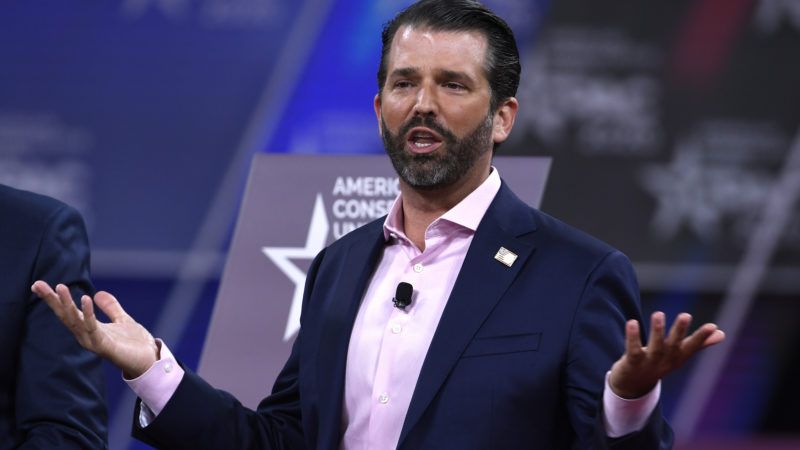'Conservatives Will Cease To Exist Online': CPAC Speakers Fret About the Tech Bogeyman
Some panelists at the conservative conference want to give the government more power over social media.

There hasn't been much love for social media companies at this week's Conservative Political Action Conference (CPAC), a massive annual D.C. gathering of the American right.
With its colossal presence, CPAC has the power to drive messaging within the Republican Party, and this year's meeting—replete with anti-tech sentiment—will be no different. A source familiar with the conference's planning process tells Reason that some participants voiced their opposition to the big-tech hostility, yet the organizers apparently ignored those concerns. Plenty of conservatives still hold tightly to free speech absolutism and limited government, but anyone watching CPAC could easily forget that.
The anti-tech fervor took center stage on Friday morning, with Sen. Josh Hawley (R–Mo.), Rep. Kevin McCarthy (R–Calif.), and Donald Trump, Jr., each of whom presented their case against social media with claims of censorship and bias against conservatives.
"With our base, across the country, this is probably a top 3 issue," Trump Jr. declared. "It's not free market, because they're getting so many benefits and protections from the federal government that they cannot discriminate so flagrantly the way they have against conservatives."
Hawley agreed. "We've got to make sure that we get the fair treatment that everyone else does," he said, noting that Facebook, Twitter, and Google should not be getting "special deals from government."
This was a reference to Section 230 of the Communications Decency Act, which lets companies remove user-generated content without being held liable for the millions of daily third-party posts on their platforms. Anti-230 activists often claim that dead-tree publishers are legally responsible for the posts they put out, so Section 230 draws an unfair distinction between publishers and platforms. But that dichotomy is entirely false and remains one of the biggest misconceptions about the law. Section 230 does not delineate between "publishers" and "platforms"; it applies to anyone who runs a site with user-generated content.
It wasn't the only anti-tech blast at the conference. A Thursday panel on social media began with remarks from Carpe Donktum (faux Latin for "seize the donkey"), a Twitter personality whose main claim to fame is his pro-Trump memes. He lamented an unfair online culture, which he said was epitomized by Reddit "quarantining" its major Donald Trump thread. (The company did so after finding violent threats against public officials.) "Without social media and without all of you and myself and other people on the stage being able to speak out and point out the lies of the media and the Democrat party, it will be very hard for us to win 2020," he said.
Carpe Donktum's Twitter account, which he sometimes uses to lament such censorship, boasts more than 234,000 followers.
Two panelists expressed similar sentiments. "If we don't fix this problem, conservatives will cease to exist online," said Dan Gainor of the Media Research Center. Jon Schweppe, director of government affairs for the American Principles Project, worried that "a few incredibly large multinational corporations" would claim "the ability to declare that it is hate speech to say that there are two genders."
It's not unreasonable to be perturbed when Facebook, Twitter, and other platforms maintain that their content evaluation processes are devoid of any personal influence. No human reviewer is completely unbiased nor any algorithm perfectly tuned. But how Schweppe and Gainor would solve the problem oscillated between impossible policy prescriptions and pure mystery.
"The First Amendment is very basic," said Schweppe. "It's very easy to understand, and we understand that free speech is centered by private actors, who, by the way, don't have the consent of the governed, then that's a real problem."
The First Amendment should be easy to understand, but it is not entirely clear that Schweppe understands it. Its prohibitions apply solely to the government, not to private companies—a drum that conservatives used to beat very loudly, until it no longer suited their ideological interests. The courts have upheld that legal standard repeatedly, with the most recent ruling arriving in response to a conservative content maker's suit against YouTube. When Prager University accused the platform of infringing on its right to free speech by placing a small portion of its videos on Restricted Mode, an optional service that about 1.5 percent of the site's viewers use to filter out mature content, the Ninth Circuit Court of Appeals fundamentally rejected the argument.
Thursday's panel did include two voices from the other side of the debate. "I can't believe I'm doing this, because I'm here to convince you at a conservative conference that government shouldn't regulate speech," said Ashkhen Kazaryan of TechFreedom. She and Chris Butler of Americans for Tax Reform posed the question: What will conservatives say when a liberal president is in office and the government enjoys such powers?
It wasn't entirely clear just how the panel's anti-tech advocates would like to alter the First Amendment standard. Schweppe did mention the idea of removing Section 230 protections, taking a page from Hawley's book, but such a move could very likely result in far more censorship. Without legal protections, companies like Facebook and Twitter would be incentivized to scrap questionable content at much higher rates for fear of landing in court.
Alternatively, companies could give up on content removal efforts entirely. Republicans might change their minds about the merits of that idea once Facebook, Twitter, and YouTube are no longer allowed to remove porn.
The ideal world constructed by Schweppe, Gainor, Trump Jr., and Hawley would still have content moderation—they just want it to be perfect. It never will be.


Show Comments (153)